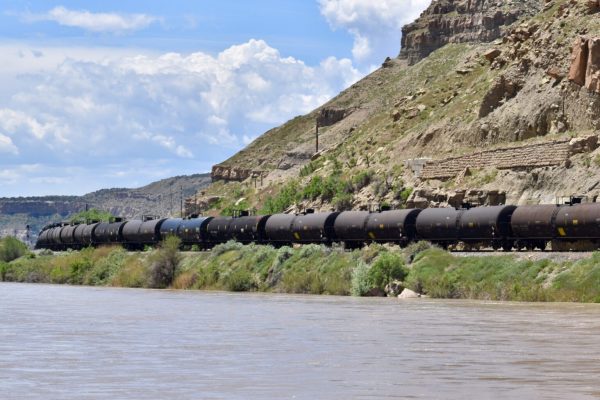Federal agencies that approved project oppose rehearing bid by proponents of Utah oil trains

Oil tanker rail cars rolling along the Colorado River in Eagle County.
The federal agencies ordered by a court to reconsider their approval of a controversial Utah oil train project aren’t backing a petition by the project’s sponsors for an immediate rehearing of the case.
In separate filings on Nov. 9, the Surface Transportation Board, the U.S. Fish and Wildlife Service and the Department of Justice told the U.S. Court of Appeals for the D.C. Circuit that its August ruling overturning the approval of the Uinta Basin Railway, which could result in a massive increase of hazardous shipments through Colorado, does not merit a rehearing “en banc” — that is, before all judges of the court, rather than a three-judge panel.
The Seven County Infrastructure Coalition, a group of Utah county governments backing the project, has asked for the case to be reheard en banc. The coalition argued in a Sept. 29 filing that the opinion issued by a panel of three circuit judges, which found that federal approval of the railway contained “numerous” and “significant” violations of the National Environmental Policy Act, conflicted with existing case law.
But federal regulators, while noting that they disagreed with the court’s ruling, rejected those arguments and sided with the lawsuit’s plaintiffs, including Colorado’s Eagle County, in opposition to a rehearing.
“As the panel saw things, the record simply did not support the Board’s conclusion, given what it saw as the Railway’s significant environmental impacts and serious questions about the financial feasibility of the project,” attorneys for the DOJ and USFWS wrote in a filing. “Regardless of whether that characterization of what the record shows is correct … en banc review … is not warranted.”
The proposed 88-mile Uinta Basin Railway would connect Utah’s largest oil field to the national rail network, allowing drillers there to ship large volumes of crude oil to Gulf Coast refineries. An estimated 90% of the resulting traffic — as many as five fully loaded, two-mile-long trains of oil tankers per day — would be routed through environmentally sensitive and densely populated areas in Colorado.
After the STB voted 4-1 in December 2021 to approve the railway’s construction, Eagle County and five environmental groups sued to block the project. With its August ruling, the D.C. Circuit panel remanded the case back to the STB, ordering the agency to correct what it said were several major flaws in its assessment of the project’s environmental risks.
Among those flaws, the panel said, were the STB’s “failure to quantify reasonably foreseeable upstream and downstream impacts … of increased drilling in the Uinta Basin and increased oil-train traffic along the Union Pacific Line.”
The Seven County Infrastructure Coalition’s petition will only be granted if a majority of D.C. Circuit judges agree to rehear the case. Otherwise, the panel’s ruling, which returned the matter of approval to the STB “for further proceedings in accordance with this opinion,” will stand — pending the further possibility of a long-shot appeal to the U.S. Supreme Court.
Petitions for rehearing en banc are rarely granted. The coalition, which has partnered with Drexel Hamilton Infrastructure Partners and the Rio Grande Pacific Corporation to develop the railway project, argued that such a review is warranted, in part, because issues raised by the case relating to the transportation of crude oil are “a question of exceptional importance.”
“The reasonable foreseeability of upstream and downstream environmental effects arises regularly, especially in the context of fossil fuel transportation projects,” the coalition argued. “Transporting fossil fuels is and will remain controversial. Such ongoing controversy is another reason to grant en banc review.”
Lawyers for the DOJ dismissed that argument: “Controversy does not equate to exceptional importance — if it did, this Court would be called upon to rehear many more cases en banc,” they wrote.
Editor’s note: This story first appeared on Colorado Newsline, which is part of States Newsroom, a network of news bureaus supported by grants and a coalition of donors as a 501c(3) public charity. Colorado Newsline maintains editorial independence. Contact Editor Quentin Young for questions: info@coloradonewsline.com. Follow Colorado Newsline on Facebook and Twitter.
Chase Woodruff
Latest posts by Chase Woodruff (see all)
- Colorado-Utah battle over oil trains could wind up tied in U.S. Supreme Court following recusal - December 12, 2024
- Colorado’s Front Range Passenger Rail sales tax vote pushed off until 2026 for planning purposes - May 23, 2024
- Colorado officials cite relentless threats, election lies in wake of SCOTUS ruling on Trump eligibility - March 5, 2024

You must be logged in to post a comment Login